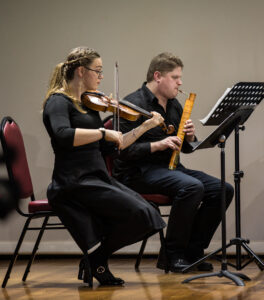In many respects, playing the historical bassoons is more difficult than playing the modern bassoons however, the colour and texture of early bassoons makes playing these instruments highly rewarding. In particular, the lack of keys, a wider bore, the individual character of each note and each individual instrument can take a while to accustom to. The main problem that modern players have when first playing historical bassoons is suddenly and randomly overblowing octaves and splitting notes. This can be addressed through the method you blow through the instrument. When you play through a historical bassoon, the breathing should be a lot deeper than playing a modern bassoon.
I like to use the analogy of trying to blow out the candles from a birthday cake. You should also as much as possible, support the reed from the sides of the mouth. Over time, you will find that the sudden random octave jumps will be gradually eliminated to the point that they rarely ever occur especially if a large amount of time is spent playing long sustained notes and intervals firstly in the lower register then progressively moving into the middle and upper registers.

When purchasing a new instrument it is necessary to break the instrument in to avoid cracks to the wood. Each maker will have their own unique instructions in this regard which you should follow carefully. Depending upon the maker, this will ordinarily involve gently playing the instrument in the middle and lower registers for 10-20 minutes a day then increasing by 10 minutes each week. Then it will be possible to play on the instrument as normal. After a few months, it is possible to play the instrument normally without any time restrictions. If the instrument has not been played for several weeks, it is necessary to break the instrument in by playing for no longer than 30 each day for a few days.
The instrument should be swabbed after use and oiled using a small amount of sweet almond oil every six months. After the first year more or less, most makers will suggest that you return the instrument to them to be rebored because of the changes to the instrument brought about by the breaking in process.
Copyright EMSQ 2019